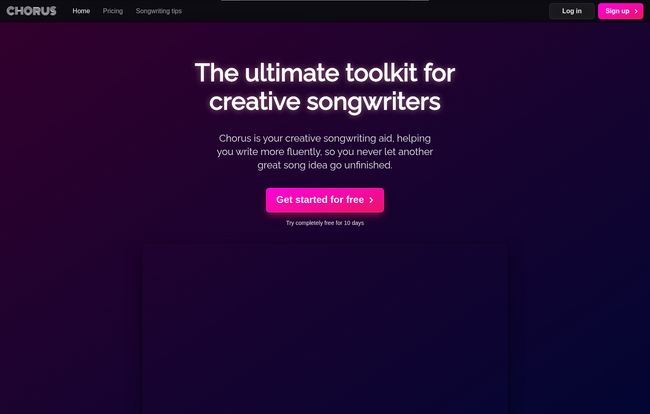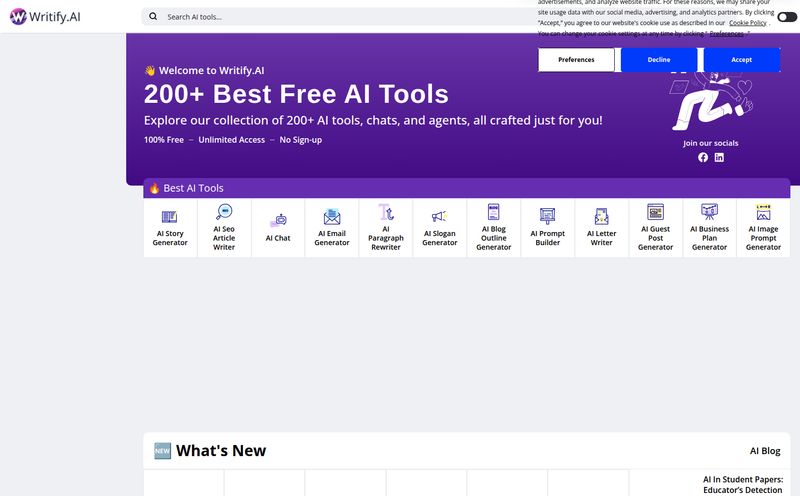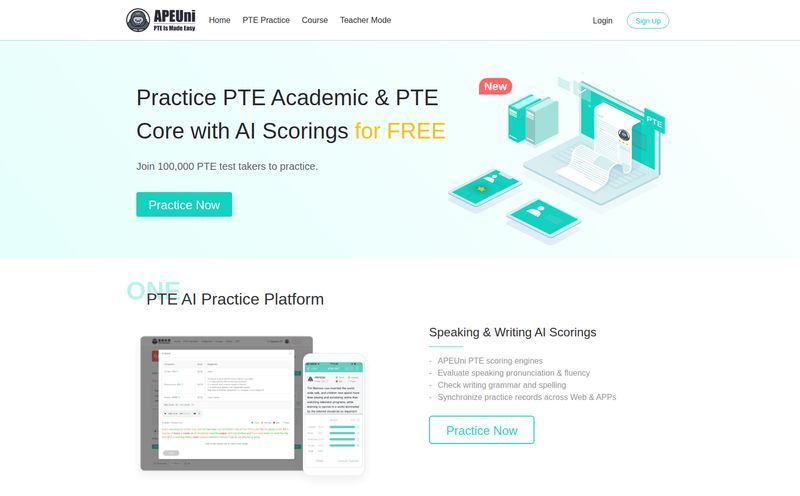We’ve all been there. Staring at a blank page—or more likely, a blinking cursor in a Google Doc—with the ghost of a killer chorus haunting the back of our minds. You’ve got a melody, a feeling, a single killer line, but the rest? It's just... not coming. It’s the songwriter’s curse, a special kind of creative purgatory. I've spent more hours than I'd like to admit trying to find a rhyme for "orange" that didn't sound like a nursery rhyme gone wrong (it's a trick, don't do it).
For years, the solution was to just step away. Take a walk. Read a book. Hope inspiration strikes like lightning. But in the world of constant content, sometimes you need that lightning on demand. So when I stumbled upon Chorus, a songwriting app that claims to be the "ultimate toolkit for creative songwriting," my inner skeptic and my desperate inner artist both perked up. An AI assistant for lyrics, rhymes, and chords? It sounded either like a gimmick or the exact digital muse I’ve been waiting for.
So, I jumped in. And I have some thoughts.
So, What Exactly is This Chorus Thing?
First off, Chorus isn't just a fancy notepad. You can get that anywhere. Think of it more like a dedicated, digital co-writer. It’s a platform designed from the ground up to tackle the specific hurdles we face as songwriters. It’s built on the idea that creativity doesn't always have to be a solo flight against the wind. Sometimes, you just need a little nudge, a tiny spark to get the engine running again.
The app combines a clean writing interface with a suite of AI-powered tools that help you with everything from lyric ideas to finding the perfect rhyme that actually fits your genre. Yes, you read that right—genre-specific. More on that in a bit, because it's a game-changer.

Visit Chorus
The Features That Actually Move the Needle
A tool is only as good as its features, right? Chorus packs a few that are genuinely clever. These aren't just bells and whistles; they feel like they were designed by people who have actually felt the pain of a half-finished song.
Genius: Your AI Co-Writer (Without the Ego)
The flagship feature is called "Genius," and it’s the core of the AI assistance. You write a line, and if you get stuck, Genius suggests what could come next. My first reaction was, "Oh great, a robot is going to write my song for me." But that's not how it feels in practice. It’s less about writing for you and more about breaking the inertia.
It’s like having a bandmate who’s endlessly patient and full of ideas. You feed it a line like, "The city lights are calling out my name," and it might spit back a few options. Some are duds, sure. But then one will hit you—maybe not the exact line, but an idea, a word, a direction you hadn't considered. It’s a prompt, not a prescription. It's great for those moments when your brain just freezes. No creative arguments, no stealing your riffs. A perfect collaborator, really.
Rhymes That Don't Sound Like a Greeting Card
Okay, this might be my favorite part. We’ve all used online rhyming dictionaries. They’re functional, but they give you every possible rhyme, from the sublime to the ridiculous. You’re writing a gritty blues track about heartbreak and it's suggesting you rhyme "pain" with "weather vane." It just kills the vibe.
Chorus’s rhyming tool is different because it’s genre-aware. You tell it you’re writing a Folk song, and it suggests rhymes that fit that world. Tell it you’re writing Pop, and the suggestions shift. This subtle distinction is massive. It saves you from self-editing out the cheesy options and keeps you locked into the right headspace. It’s the difference between finding a rhyme and finding the right rhyme.
Triggers and Chords - The Creative Spark Plugs
Rounding out the big features are "Triggers" and "Chords." Triggers are basically genre-specific word clouds designed to kickstart your imagination. If you're stuck on a verse, you can pop open the Triggers for, say, "Indie Rock," and get a list of evocative words and themes. It’s like a targeted brainstorming session. I found it surprisingly effective for finding a new angle on a tired topic.
The Chords feature is a nice touch for those of us who aren't music theory wizards. It provides chord suggestions to help build out a progression. Whether you need a simple verse structure or want to figure out a middle-8, it gives you musically sound options without you needing to have a degree in composition. It’s another way Chorus lowers the barrier to getting a song from your head into the world.
Who is Chorus Actually For?
I can see this tool being a huge help for a few different types of people. If you're a beginner, it’s an incredible learning tool. It helps you understand song structure, rhyming patterns, and how chords and lyrics can work together. It takes away some of that initial intimidation.
But what about the pros? The testimonials on their site feature songwriters like Jay Shehan and Keith London, and I get it. For a seasoned writer, Chorus isn't about learning the ropes. It’s about efficiency. It's a tool to break through the inevitable block that even the most prolific artists face. It's that "nudge" Jay Shehan talks about. It’s a way to keep the session moving forward when you might have otherwise called it a day. Plus, the collaborative features mean you can co-write with someone across the country in real-time, which is a massive plus in today's music scene.
Okay, Let's Talk Money: The Chorus Pricing
This is usually where the dream dies, right? You find a great tool and it costs an arm and a leg. I was pleasantly surprised here. Chorus offers a single plan called Chorus Studio for $6.99 per month. That's it. No complicated tiers, no enterprise-level nonsense. For less than the price of two fancy coffees, you get access to everything: the AI Genius, rhymes, triggers, collaboration, all of it.
They also offer a free trial, so you can get in there and see if it clicks with your workflow before spending a dime. In my opinion, for a tool that could potentially save you hours of frustration and help you finish more songs, the price is more than fair. It's a small investment in your own creativity.
The Good, The Bad, and The Creative
No tool is perfect. While I'm pretty high on Chorus, there are a couple things to consider. On the plus side, the AI assistance is brilliant for writer's block, the genre-specific suggestions are a standout feature, and the collaborative tools are super practical. It works across devices, and the price is incredibly accessible. It just… works.
On the flip side, you’ll probably need an internet connection to get the most out of the AI features. And then there's the philosophical question. Some artists might feel that relying on an AI, even for suggestions, could dilute their own creative voice. I see that point, but I've come to view it differently. It's not a crutch, it's a tool. A painter uses different brushes; a guitarist uses different pedals. This is just another tool in the songwriter's toolbox. The final decision on every word and every chord is still yours.
So, What's the Verdict? Is Chorus Worth It?
After playing around with Chorus for a while, I'm a convert. It’s not going to write a Grammy-winning hit for you while you sip a margarita. You still have to bring the heart, the story, and the soul. That's your job.
But Chorus does something almost as important: it clears the path. It removes the little bits of friction that can bring the whole creative process to a grinding halt. It’s a sparring partner, an encyclopedia, and an endlessly patient muse all rolled into one slick, affordable package. If you’re a songwriter at any level and you’ve ever felt the frustration of a great idea getting stuck, you owe it to yourself to give the free trial a shot. It might just be the best co-writer you've ever had.
Frequently Asked Questions about Chorus
I had a few questions myself, so here are some quick answers to things you might be wondering.
How is Chorus different from a regular rhyming dictionary?
The biggest difference is context. A standard rhyming dictionary gives you a brute-force list of every word that rhymes. Chorus provides genre-specific rhyme suggestions, meaning the words it suggests are more likely to fit the style and tone of the song you're actually trying to write. It's about quality over quantity.
What are 'Triggers' and how do they work?
'Triggers' are curated lists of inspirational words and themes tailored to specific genres. If you're feeling uninspired, you can select your genre and get a cloud of evocative words to help spark new ideas for your lyrics. Think of it as a targeted brainstorming session to get your creative juices flowing.
Does the AI 'Genius' feature write the lyrics for me?
Not really. The Genius feature is designed to be an assistant, not an author. You provide a line of your own, and it offers several potential next lines. The goal isn't for you to just copy and paste, but to use the suggestions as a jumping-off point to overcome writer's block and explore new directions you might not have thought of on your own.
Who owns the copyright to the lyrics I write in Chorus?
Based on their FAQ, you own the copyright to your lyrics. The suggestions from the AI are tools to help you write. The final creative work is yours, and so are the rights to it. This is a standard and important policy for any creative tool.
Is Chorus good for complete beginners?
Absolutely. In fact, it might be one of the best tools out there for beginners. It helps demystify parts of the songwriting process, like finding chords that work together and understanding rhyme schemes, all within a supportive and non-judgmental environment.
Can I collaborate with my bandmate who uses a different device?
Yes. Chorus is designed to work across multiple devices, and it supports real-time collaboration. You and a co-writer can work on the same song simultaneously, seeing each other's changes as they happen, no matter if one of you is on a laptop and the other is on a tablet.



